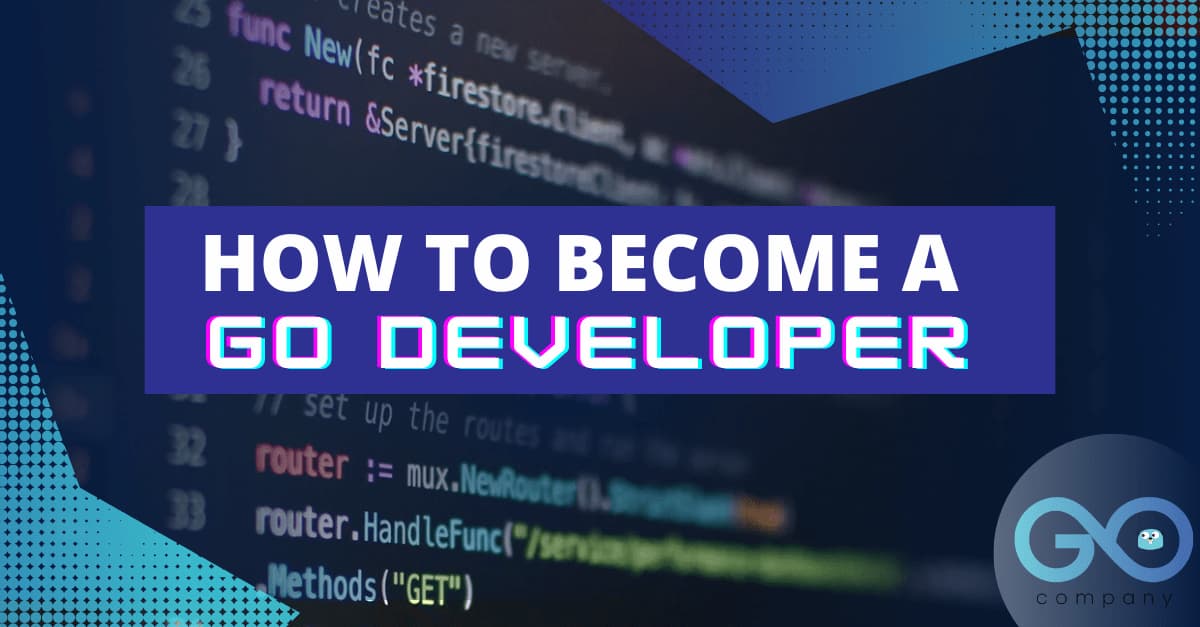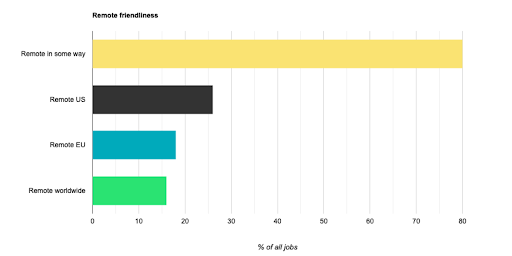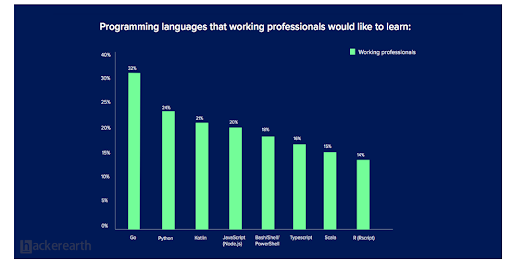How to Become a Golang Developer?

There is a big difference between knowing a language and becoming a developer. If you wish to become a Golang developer, it would take time, patience and commitment from your end to be the absolute best. If you are ready to put in the effort, then this blog is for you. You will get a detailed insight into how to get started and master each concept.
So, let us begin!
Why Should You Opt for Backend Development?
In order to understand this easily, let us take the example of Netflix. When you login, you have to scroll through the various TV shows and movies. Once you select a show, you get to see the description of the show, choose to add captions, adjust volume, etc. Well, this represents the front-end of Netflix.
So what is backend development? Well, it is concerned with how Netflix operates, i.e, the process that goes on behind the scenes. You might have seen that Netflix showcases recommendations. Well, it tracks your behavior, and based on your interest, fetches data from the server.
Don’t you think that the task is intriguing and that you will be responsible for something only understood by a handful of people? If you are on the same page, then backend development is for you!
You should opt for backend development as it will help you get familiar with several programming languages. And this will give you the much-needed boost as far as your career is concerned. You can go on to become the most sought-after backend developer, carry out system programming, or even hone your skills to become a Full Stack developer (provided you learn database, networking and front-end development as well).
Does Golang Offer Good Career Opportunities?
By this time, you must have realized that this blog is about Golang. But why should you choose Golang?
- Well, to start with, Golang is quite fast. It is said to be 40 times faster than Python! As you can imagine, you can accomplish a lot of tasks in a limited time. Golang’s support for CSP-style concurrency and parallelism makes it a good programming language for systems programming.
- Furthermore, Golang was developed by Google to counter the problem of scalability. And the language consists of important libraries and is highly readable. So, Golang is easy to learn and is also very forgiving for beginners, if you commit mistakes.
- If you look at LinkedIn, you will find 20,000+ job postings for Golang developers. And if you go by the statistics, then the average salary is around $100,000 per annum. Given below is a graph that shows the job ads that have been posted since the later half of 2020.

Sorce : Golang Job Statistics December 2021 (golangprojects.com)
As you can clearly tell, it is high time that you learn Golang as it is going to be in high demand in the coming five years. Who knows maybe you can land yourself a job in Google?
Are you still with me? Good! That means you have a penchant for coding and have an interest in learning Golang. Henceforth, I will guide you how to get started with Golang right from scratch.
What Are the Prerequisites for Learning Golang?
- Coding in Golang is quite simple, but it would definitely help if you have any programming experience in C or Java. This will help you understand functions easily.
- You need a tool that will help you edit the code. In this reward, you can opt for IDEs and text editors like VSCode which is free, or you can opt for paid ones like GoLand.
- You will require a command terminal, like Powershell or cmd (Windows), or any terminal on Mac and Linux.
Finally, you have to install Go to get cracking!
What Will You be Learning in 3 months?
Now, it’s very important that you learn Golang without being hasty. So, your primary task would be to learn and master all the basics.
- You will get to know how to write your first code on Golang, presumably, Hello World code. Following this, you will learn about filenames, identifiers, keywords, types, operators, constants, for loops, control structures and functions.
- Based on the concepts you discern, you have to implement them as well. And what better way can there be other than coding on your laptop or desktop? You can try finding LCM and GCD of two numbers, printing full pyramid using ‘*’, printing Floyd’s triangle, etc.
Remember the more you code, you will become aware of the interface of Golang and it would help you develop logic greatly!
What are You Going to Learn in 6 months?
Now that you have completed your initial training in Golang, it’s time to shift gears.
- During the course of the next three months, you will learn about pointers, structures, interfaces and methods in Golang. You will get to know how to assign and initialize values to elements in the array. Although arrays are crucial, you will find that it is recommended that you use slices.
- Slices offer more flexibility than arrays in Go. It offers access to various parts of arrays in sequential order. You can use index values to access arrays and slices. Soon, you will get introduced to maps, where keys are used to access unordered element groups. Once you get acquainted with maps, you will find it easier to retrieve data through keys.
This is what you will be learning in six months. It is better to take it slow, so that you do not face issues during the later course of learning Golang.
What Should You Focus on After 6 months?
Following the six months, you will be delving deep into Golang. You will be:
- Mastering Various Golang Libraries and Frameworks
Your focus should always be on various ways to make Go easier. Thus, you will be learning frameworks, databases and libraries. As far as frameworks are concerned, you should start with Revel, Gin, Beego, and Echo. Next, you have to learn the nitty-gritty of libraries such as GORM, Gen, CLI, etc.
FInally, you will move on to databases, for which you can check out PostgreSQL or Oracle.
Timeline: 2-3 months - Knowing Workarounds in Error Handling
Error handling is a bit different in Golang compared to other languages. But, if you are beginning Golang itself, then you would have to be attentive while you debug. Otherwise, errors might pass on silently and that is just asking for trouble.
If a function is destined to fail or have issues, you would get the errors in terms of final values when you call the function. You will not be shown any exceptions. Now, it is upto you to decide what you wish to do with the errors.
Timeline: 5 days and practice - Reusing Codes with Packages
Code reuse is an integral part of Golang. And you have to use packages for that, namely the ‘fmt’ package. This package deals with numerous functions associated with formatting and output. Basically, it keeps the function names precise and helps in organization of codes. Once you learn about packages for reusing codes, you will get introduced to modules. It stores Golang package collection in a tree, with the go.mod file defining the path used for importing the root directory.
Timeline: 1 month
- Using Goroutines and Channels
In Golang, you will get introduced to concurrency, from which you can decipher the meaning of sequential and concurrent execution. You will learn about Goroutines and how it is handled with timers to run program tasks and manage responses. Soon, you will get introduced to Channels which helps in easing the communication between Goroutines. Since channels are typed, you can use them as function return values, etc.
Timeline: 1 month
So, in a time span of 1 year, you will be learning so much. The important thing here is to keep revising and applying the concepts that you have learnt via programming.
What Are the Next Steps?
So far so good? Great! Then let’s move on to the next chapter of your learning journey.
- Testing in Golang
If you are new to testing, then it is ideal if you begin with unit testing. Although Go libraries have testing packages by default, you should use frameworks like Gingko and GoCheck for unit, behavior and integration testing.
While integration tests ensure that every component of an application functions flawlessly together, unit tests focus on testing the smallest components of a given software. Functional tests, on the other hand, check whether or not the program conforms to the requirements.
Timeline: 6 weeks (roughly 2 months)
- Creating Command Line Programs
If you wish to establish yourself as a good Golang developer, then you would have to know about command line apps. Golang is a popular choice for Command Line Interface as it does not have deployment dependencies. It compiles to a static binary. Soon, you will learn to create subcommands and deal with arguments. And gradually, you will learn how to interact with an OS.
Timeline: 2 months
The graph below depicts how many programmers are willing to learn Golang.

Source: Google's Go scores as the top language developers want to learn
- Creating JSON REST APIs
This is the most challenging yet interesting part of being a Golang developer. This is a never ending learning process and the more you create, the more you will learn about encoding and decoding APIs. You will get to know how to work with databases, converting data structures in GO into JSON with marshaling, building routers, describing path variables and more.
You will also need to know about handlers that are responsible for returning specific or all items, or adding new items.
Timeline: 2 months and more
How Can You Track Your Progress?
- Everything looks good on paper, until you try to apply it. You might be wondering how you can track your progress in Golang programming. Well, you can always take tests to check whether you have understood the concepts or not. You can try various sites like Gitbook, TestDome, Adaface, etc.
- Another way to track your progress would be to debug and assess other’s codes. You can try to find faults in the codes, or you can modify the lines a bit.
- Finally, you will have to work on projects, carry out system programming, build REST APIs, or develop concurrent programs.
If you see that you are able to handle all these tasks with ease, then you have become a master in Golang and are ready to work for any big company in the world as a Golang developer specializing in "go development." So, you can see that all it takes is hard work and an interest in programming. Nobody has an innate sense for programming, rather it has to be developed!